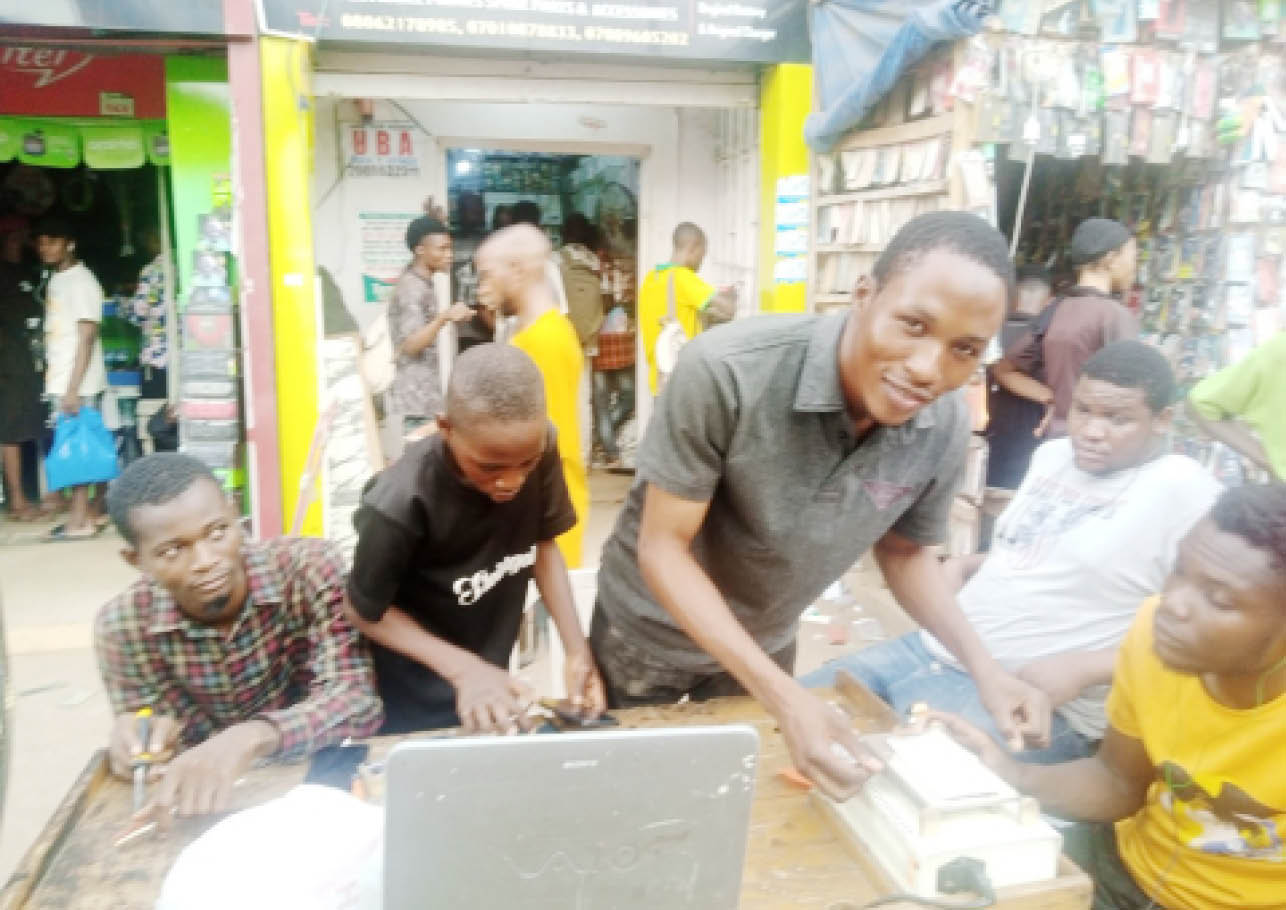The ongoing strike by the Academic Staff Unions of Universities (ASUU) has given some youths in the country the opportunity to be idle, which has led to an upsurge in the crime rate in some instances. However, that is not the story of the many undergraduates who eke out a living at the popular Challenge phone market in Ilorin, which is the epicentre of phone-related and software activities.
As a result, the largely youth population have not only turned the situation to making legitimate money through the repair of phones and other gadgets, they have invited friends and colleagues to take advantage of the present situation to better their lot.
- We ‘ll miss Alaafin’s intellectual capacity – Osinbajo
- Intellect comes before money in movie production – Bimbo Manuel
Many of them who spoke with Daily Trust Saturday said the ongoing strike had given them the opportunity to fully concentrate and improve on their vocational skills, which have turned to financial benefits. They also noted that the quest to make ends meet had come with its challenges, struggles and successes.
When our correspondent visited the phone market recently, the place was bubbling with activities as some of the students who have now turned fulltime phone technicians were seen trying to woo customers for patronage.
Many of them who spoke with our correspondent expressed misgivings about the ASUU situation.
Mohammed Abdulraheem, a Computer Engineering student of the Federal Polytechnic, Offa, said the strike and their subsequent stay at home came with mixed feelings.
“The strike has been very beneficial on one hand because I now make more money, but on the other hand, it has been a setback academically as my study is not progressing,” he said.
Mohammed, who said he could not really say if the strike should continue or not, advised the youth to see the situation as an opportunity to engage in any vocation of their choice.
“Before the strike, there were days I came here after school and did not earn anything, but now, I earn between N3,000 and N5,000 or more daily. But the government should try and end the strike in order for us to go back to school,” he added.
On his part, Ibrahim Baba, a Political Science student from the University of Ilorin, said although the strike had affected his educational pursuit, his stay in the market had translated to more money for him.
“Normally, while in school there were sales I often missed, but now, that is no longer the problem as my being around has given me time to woo more customers and increase the volume of my sales. I don’t think of going to class or any academic work now. Although there are times that sales are not encouraging despite our presence, it has been a blessing financially. I make over N4,000 a day now. That is why it will be difficult for people like us to take to crime.”
Usman Nasir, a Mathematics graduate of the University of Ilorin, who was encouraged to learn the vocation while waiting for his National Youth Service Corps (NYSC) call up said, “Now I have the time to concentrate on my work here as an apprentice. When school was in session, I was struggling to juggle the two, but now that we are on strike, I am able to focus on learning the trade.
“My prayer now is that the strike should be quickly called off so that we can get our certificate and go for youth service. But I have no regret so far taking the opportunity of the strike to learn the trade.”
He advised the youth to use the period of the strike to improve and develop themselves, saying, “We don’t know when the strike will be over, so it is better to take advantage of the time now to arm oneself with entrepreneurial skills to adequately prepare for the future ahead,” he said.
Also, Sodiq Abdulrahseed, a student of Kwara State Polytechnic who engages in phone sales and repair said, “I decided to learn the trade to be independent, especially after incessant strikes that have plagued the education sector lately.
“I am a man, and I know that very soon, responsibilities will fall on my shoulders and people will be looking up to me for care. So, with the present state of the country and the incessant strikes, I have to take this decision, and I have not regretted.
“If we were not on strike, I would have been in school, but now, I make money. Even at home, I have been able to cater for my siblings within my capacity. But I don’t think the strike should be allowed to continue. As an undergraduate, too much strike actions may make you to be unconcerned about education, and subsequently, you want to pursue money. If the strike continues, it will definitely discourage many people from prioritising education.”
Also, Oyewole Sadiq, an engineering student from the University of Ilorin said the strike had extended his study from five years to seven, and called on the ASUU and the federal government to find a common ground.
He said, “I have gained from it with an improvement in my financial status because I make up to N5,000 daily. But I am still not happy. For now, calling off the strike is the most important thing for me. Those of us who are doing nothing now should take advantage and learn a trade because this ongoing strike will not be the last from ASUU.
Kolawole Abdulsamad, an Industrial Chemistry student of the University of Ilorin, said the strike had afforded him the opportunity to gain more knowledge and make more money from his trade.
He said, “Before now, I had split my time between here and school. I had earmarked four years for my education, but that is no longer the case. I prefer coming here than going to school now. I don’t think I can lecture after my education because I make more money here. I sponsor my education, and that is why I am happy about the strike. But some of our colleagues get funding from their parents and don’t know how to make the best use of this period, which is quite unfortunate. Many of our colleagues have taken advantage of the situation to learn a trade.”
For Damilola Owolabi, also a student of the University of Ilorin, the strike has positively impacted him. “I am an apprentice (software technician), those that ‘flash’ phones and repair software of any gadget. I use what I make here to support my education. I am now in 300-level going 400-level and would prefer that the strike is suspended for us to complete our education.
“We had wasted years at home before now and we are at it this again. I pity my colleagues who are still waiting for white collar job instead of learning a skill, with our present economic situation in Nigeria. I think we have reached a stage in the country that we should make it mandatory upon ourselves to learn a trade/vocation or something, irrespective of our present jobs. This period has been lucrative for me. I make up to N10,000 a day,” he also said.
Mohammed Bashar, a student of English/Social Studies at the Kwara State College of Education, Ilorin said, “I will say the strike has been a blessing because of the opportunity it has afforded us to come here and make money. I don’t care whether they call if off or not, so long as it allows me to continue with my trade as a phone trader. I know of many graduates who have turned beggars, all in the name of looking for jobs. Today, we have many degree holders who are weaving Aso Oke here in Ilorin. Our priority now is how to make the best use of this period financially, and we have not been disappointed.”
Also, Ola Ibrahim, a student of Federal Polytechnic, Offa, said, “At times I earn N5,000 or more daily. But I want the strike to be called off for us to complete our studies to face other things. At least our engagement here has taken us away from the street and crime.
“My advice for the youth is that they should look for a means of livelihood as government is not doing anything to secure the future of the country.”
A graduate of Accounting from Kwara State Polytechnic, Ayodele Timileyin, who is the chairman of the market taskforce, said, “The vocation is dynamic. Sometimes we make up to N3,000, but when we have good sales we can make up to N30,000. It depends on the number and calibre of customers we have.”
Speaking on the issue, the chairman of the Kwara State Association of Telecommunications Traders/Allied Dealers (KWATTAD), Comrade Sulyman Abdulrahman Moyosore, popularly known as Amir, said the situation in the phone market had underscored the importance of having something else to do as a student or worker to earn legitimate money.
Amir, who also doubles as the president of the Kwara State Association of Phone Technicians (KWAPTECH), said they had over 800 registered members, including students from all the higher institutions in and outside the state.

 Join Daily Trust WhatsApp Community For Quick Access To News and Happenings Around You.
Join Daily Trust WhatsApp Community For Quick Access To News and Happenings Around You.


